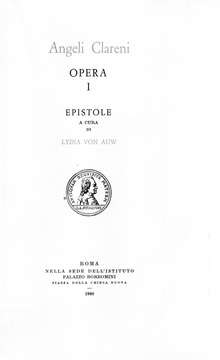Angelo da Clareno

Angelo da Clareno (1247–1337), also known as Angelo Clareno, was the founder and leader of one of the groups of Fraticelli in the early 14th century.
Life
Originally known as Pietro da Fossombrone, he was born about 1248, and entered the Franciscan order around 1270. Believing that the rule of St. Francis was not being observed and interpreted according to the mind and spirit of the Seraphic Father, he retired to a hermitage with a few companions and formed a new branch of the order known as the "Clareni". The influence of the prophetical writings of Joachim of Floris, a Calabrian abbot, on Angelo and his followers, and in fact on the "Spirituals" generally of the thirteenth century, cannot be overrated.[1]
By the Bull of Pope Sixtus IV, Dominus Noster Jesus Christus, the "Clareni" were united to the main body of the order and placed under the obedience of the Minister General. But the number of Angelo's followers was small; and his so-called reform brought upon himself in particular, and the "Clareni" in general, the suspicious disfavour of the Friars Minor who were not prepared to follow the extreme interpretation of the rule of St. Francis which Angelo had adopted. The Provincial Minister had Angelo and a few other "zealot" leaders arrested in Rome as heretics and schismatics. They were imprisoned for nine years when in 1289, a new Provincial, Raymond Gaufredi ordered them released.[2]
Fearing that to leave them in the March of Ancona would likely expose them to continued persecution, Gaufredi sent them to Armenia Minor (Cilicia), where the king had made a request to the Pope for the services of some friars to instruct the people. Angelo was sent, along with Tommaso da Tolentino, Marco da Montelupone, and Pietro da Macerata.[3] Despite their success, or perhaps because of it, the friars in the province of Syria became jealous and agitated against the "zealots" who were exiled from Armenia towards the end of 1293.[4]
The Conventual guardian at Acre summoned Angelo and Peter of Macerata to Cyprus in order that Angelo might clear his name preaching before the king and court. However, the guardian of Nicosia detained them as excommunicates. With their work in Armenia hampered they decided to return to Italy. However, the vicar of the Provincial of the March let them know they were not welcome, so Guafredi and others, among them, Conrad of Offida, advised them to appeal to the new pope, Celestine V.[2]
Celestine absolved them of their vows of obedience to their Franciscan superiors, and constituted them as a separate group of Poor Hermits who could live at the monasteries of the Celestines. He appointed Peter of Macerata as superior under the name of Brother Liberato. Celestine also named Cardinal Napoleone Orsini protector. Celestine was 79 when he became pope, and having little experience, proved relatively ineffectual, and resigned within six months. His immediate successors were less favorably disposed towards the new order.[5] Upon the death of Liberato in 1307, Angelo became superior.
In 1311, he came to Avignon to answer a charge of heresy that had been brought against him. He was finally acquitted after a tedious and searching examination.[1]
In 1337 he retired to the little hermitage of Santa Maria d'Aspro, in the diocese of Marsico in Basilicata, where he died on the 15th of June.
Works
Angelo Clareno is the author, at least in great part, of the Chronica septem tribulationum Ordinis Minorum, which records the persecutions suffered by the "Spirituals",[6] beginning with the innovations made during St. Francis' sojourn in the East, and continuing under Elias, Crescentius, and Bonaventure. This work is characterized by heroic endurance; but is tinged with bias and bitterness. Another work of Angelo's that deserves mention is the Declaratio regulae Minorum.
See also
Notes
- 1 2 Donovan, Stephen. "Angelo Clareno da Cingoli." The Catholic Encyclopedia Vol. 1. New York: Robert Appleton Company, 1907. 9 Jun. 2015
- 1 2 Douie, Decima Langworthy. The Nature and the Effect of the Heresy of the Fraticelli, Manchester University Press, 1932
- ↑ Basilica Papale e Sacro Convento di San Francesco in Assisi (Italian language).
- ↑ Michael Robson,The Franciscans in the Middle Ages.Boydell Press, 2006 ISBN 1-84383-221-6
- ↑ Botterill, Stephen N., "Celeno, Angelo", Medieval Italy, (Christopher Kleinhenz, ed.), Routledge, 2004 ISBN 9781135948801
- ↑ E. Randolph Daniel. "Angelo da Clareno", Encyclopedia of the Medieval Chronicle,(Graeme Dunphy, ed.) Brill Online, 2015
Bibliography
- Angelo Clareno: A Chronicle or History of the Seven Tribulations of the Order of Brothers Minor, Franciscan Institute Publications, 2005. ISBN 978-1-57659-198-7
External links
| Wikisource has an entry from Catholic Encyclopedia about: |
- Friedrich Wilhelm Bautz (1975). "Angelo da Clareno (Angelus von Cingoli; Pietro da Fossombrone)". In Bautz, Friedrich Wilhelm. Biographisch-Bibliographisches Kirchenlexikon (BBKL) (in German). 1. Hamm: Bautz. cols. 173–174. ISBN 3-88309-013-1.